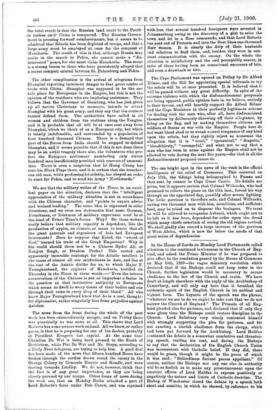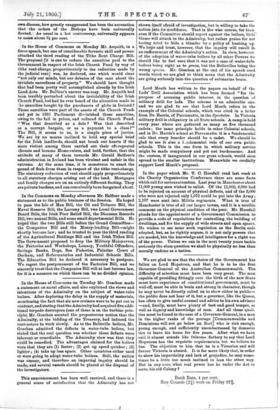In the House of Lords on Monday Lord Portsmouth called
attention to the continued lawlessness in the Church of Eng- land, and asked the Prime Minister if he was prepared to give effect to the resolution passed by the House of Commons on May 10th, 1899—the vague minatory resolution which declared that if the Bishops could not keep order in the Church, further legislation would be necessary to secure obedience to the law of the Church and realm. We have dealt at length elsewhere with the reply of the Archbishop of Canterbury, and will only say here that it breathed the authentic spirit of the English Church in its noblest and highest form. The keynote of the speech was the phrase, "whatever we are to do we ought to take care that we do not narrow the Church of England." The Primate of all Eng- land pleaded also for patience, and declared that if only they were given time the Bishops could restore discipline to the Church. Lord Salisbury very wisely contented himself with strongly supporting the plea for patience, and for not exacting a slavish obedience from the clergy, which had been put forward by the Archbishop. Lord Halifax continued the debate in a somewhat combative and threaten- ing speech, trailing his coat, and daring the Bishops to say that the declaration of the English Church Union was inconsistent with Catholic belief. If they did, there would be peace, though it might be the peace of which it was said : " Solitudinem faciunt pazem appellant." Of course, neither the Bishops nor any one else in authority will be so foolish as to make any pronouncement upon the amateur efforts of Lord Halifax to express positively or negatively the nature and limits of Catholic doctrine. The Bishop of Winchester closed the debate by a speech both short and sensible, in which he showed, by reference to his own diocese, how greatly exaggerated has been the accusation that the orders of the Bishops have been universally flouted. As usual in a hot controversy, universally appears to mean about 7i per cent.



































 Previous page
Previous page